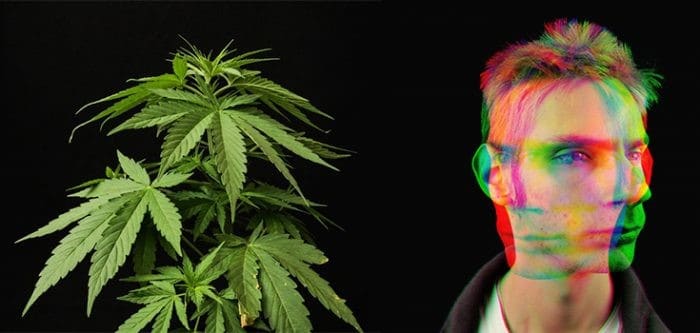It’s not uncommon for cannabis aficionados to view the herb as a panacea to all problems and ailments, physical or mental. However, while cannabis does have sweeping positive effects and benefits from medical and recreational nature, it’s important to remember that schizophrenia is a whole different ballgame.
The correlation between cannabis use and psychosis has been a contentious subject among scientists, interlaced with a lot of variables. At times, the matter resembles the chicken-egg paradox – schizophrenic tendencies are often associated with heavier cannabis use, but it’s unclear which came first.
However, with more research on the matter, scientists have come to agree on one particular scenario involving cannabis use and schizophrenia that appears to be have rather limited outcomes.
Cannabis Use as Alleviation of Schizophrenia?
Similar to the way some people with depression and anxiety self-medicate with cannabis, some people diagnosed with schizophrenia do that as well, in search of respite from their obsessive thoughts. They may self-medicate during the prodromal period (before they are diagnosed), as they might have symptoms, but not recognize what they are. Furthermore, cannabis can be a mood-booster, which is clearly always a benefit, one that is often unattainable when it comes to such types of mental conditions.
Similar to the case with psychosis, this is an overly simplistic and limited view. While it’s possible that cannabis can have such effects in certain scenarios, perhaps if the patients are in a better state already, it’s important to know which parts of cannabis present relaxing effects – CBD and certain terpenes, and their synergy. [1] CBD has, indeed, been found to “normalize” the brain of people with psychosis, which is why those who suffer from schizophrenia are likelier to self-medicate with cannabis. This might partly reveal the link between cannabis use and schizophrenia as correlational rather than a causal one.
In spite of this, one study has established a correlation between CBD and anxiety, so again, the results can be strictly individual in such cases, even for something like CBD that’s considered almost universally benevolent and beneficial. [2]
Can Cannabis Use Cause Schizophrenia?
It can’t do it alone, but it may fuel it and act as a catalyst, given the breeding ground is present.
That breeding ground is usually composed of genetic predisposition to schizophrenia, which is usually signified by family history of the same and/or similar mental problems. If people, prone to such conditions, engage in cannabis use, especially during their adolescence, they could concoct a compound recipe for potential disaster. [3] However, it’s worth noting that cannabis use, especially when it’s heavy and during adolescence, might not stand alone as a sole vice and, rather, can be just one manifestation of stronger risk behavior that involves other mind-altering substances. [4] Furthermore, as mentioned above, the link between schizophrenia and cannabis use is correlational rather than casual, which will always be a serious disclaimer.
Also, it’s not so much cannabis altogether, but THC in particular, that is generally responsible for anxiety and psychotic episodes which people with schizophrenia should be wary of. [5] And just as every story has another side, many people with mental issues find cannabis, with THC naturally being the central ingredient, to be an almost literal life-saver. [6]
Looking at the neurological roots of both cannabis use and schizophrenia separately might shed an extra light on their relationship and possibly hints at its volatility.
For example, during adolescence, our brain weeds out the unnecessary connections between brain cells – a process, called synaptic pruning. One key region in which this process occurs is the prefrontal cortex, which is rich in CB1 receptors, and activating them with cannabinoids during such an important and delicate time can potentially throw them off their pressing functions. [7] Add on top of that the fact that many people who suffer from schizophrenia already have a gene variant that speeds up this synaptic pruning, and you basically get a major neurological process that might been severely tampered with.
Another study on mice from Tel Aviv University (TAU), published in Human Molecular Genetics, found that mice, genetically susceptible to the condition, “developed schizophrenia-related changes after being exposed to cannabis.” [8]
“Our research demonstrates that cannabis has a differential risk on susceptible versus non-susceptible individuals. In other words, young people with a genetic susceptibility to schizophrenia – those who have psychiatric disorders in their families – should bear in mind that they’re playing with fire if they smoke pot during adolescence,” explains Dr. Barzilay, a child and adolescent psychiatrist at TAU’s Sackler School of Medicine.
The researchers believe this is due to reduced levels of BDNF [brain-derived neurotrophic factor], in the schizophrenic mice’s hippocampus, as BDNF has protective neurological functions, which include mediating the potentially psychotic effects of THC.
This is why if people who suffer from or are susceptible to schizophrenia are looking at cannabis as a source of relaxation and respite, it might be a safer bet to focus on cultivars rich in CBD, and possibly even forego THC altogether. However, the end results can be strictly individual and involve a variety of variables that can be almost impossible to pin down and predict with absolute precision. Depending on the exact state of the person and his/her particular disposition outside of schizophrenia, THC could potentially have positive effects as well, especially when consumed in moderation.
Written By Petar Petrov, Staff Writer for Terpenes and Testing Magazine and Extraction Magazine
References
- Bhattacharyya et al, “Effects of Cannabidiol on Medial Temporal, Midbrain, and Striatal Dysfunction in People at Clinical High Risk of Psychosis, A Randomized Trial”, JAMA Psychiatry. 2018, Volume 75(11):1107-1117. [Journal Impact Factor = 16.642; Times Cited = 7]
- Kamal et al, “Cannabis and the Anxiety of Fragmentation—A Systems Approach for Finding an Anxiolytic Cannabis Chemotype”, Front Neurosci. 2018, Volume 12: 730. [Journal Impact Factor = 3.877; Times Cited = 2]
- D’Souza et al, “Cannabis and psychosis/schizophrenia: human studies”, Eur Arch Psychiatry Clin Neurosci., 2009, Volume 259(7): 413–431. [Journal Impact Factor = 3.525; Times Cited = 253]
- Huang et al, “Parallel Development of Risk Behaviors in Adolescence: Potential Pathways to Co-occurrence”, Int J Behav Dev. 2012, Volume 36(4): 247–257. [Journal Impact Factor = 1.304; Times Cited = 40]
- Gage, “Cannabis and Psychosis: Triangulating the Evidence”, Lancet Psychiatry, 2019, Volume 6(5):364-365. [Journal Impact Factor = 18.329; Times Cited = 0]
- Sexton et al, “A Cross-Sectional Survey of Medical Cannabis Users: Patterns of Use and Perceived Efficacy”, Cannabis and Cannabinoid Research, 2016, Vol. 1, No. 1, open access. [Journal Impact Factor = N/A; Times Cited = 46]
- Heng et al, “Differential developmental trajectories for CB1 cannabinoid receptor expression in limbic/associative and sensorimotor cortical areas”, Synapse, 2011, Volume 65(4): 278–286. [Journal Impact Factor = 2.945; Times Cited = 97]
- Segal-Gavish et al, “BDNF overexpression prevents cognitive deficit elicited by adolescent cannabis exposure and host susceptibility interaction”, Hum Mol Genet., 2017, Volume 26(13): 2462–2471. [Journal Impact Factor = 4.902; Times Cited = 10





